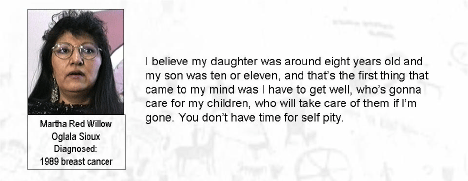Treatment - Before Treatment
QOL Tree
Treatment
Before Treatment
Ceremony
Surgery
Radiation
Chemotherapy
After Treatment
Palliative Care
Hospice and EOL
Some things you may want to do before you begin treatment
- If possible, have grandchildren and other children come over to visit with you before you go to the hospital
- Playing with the children and talking with the children reminds patients why it is important to overcome this disease
- You may find that your children or grandchildren help you feel stronger
- They may make you laugh and remind you how important it is for you to stay well to be able to teach and enjoy the next generation

"I believe my daughter was around eight years old and my son was ten or eleven, and that's the first thing that came to my mind was I have to get well, who's gonna care for my children, who will take care of them if I'm gone. You don't have time for self-pity."
- If the hospital is several hours from the home, consider staying in a hotel the night prior to hospital check-in, especially if you need to check in very early in the morning (e.g., 6:30 a.m.). Many hospitals have programs that help pay for the hotel
- Either check yourself or have someone you trust contact the tribe or your insurance to find out what is and is not covered by your insurance or tribal coverage.
- Several programs do not pay for cancer treatment drugs
- If this is true for you, talk with your provider first
- Then talk with the clinic or hospital Social Worker, who frequently have ways for you to get the medications you need
- There is a lot of paperwork
- Some forms and information you may need to fill out over and over again
- Have someone from your family make copies of your records or a summary of your information (insurance number; tribal enrollment number if you are using tribal programs)
- You may want someone you trust to help you fill out the paperwork on your behalf
- Although you are not expecting death from these treatments, it is a good idea to get your living will (Advanced Directives) and final will and testament written
- Many hospitals/ clinics require you to have Advanced Directives document prior to treating you in their facility
- Make certain a legal representative is involved and notarizes the documents
- A lot of time we think that we don't have anything to leave behind, but when you really begin to thing about it, you probably have some regalia, jewelry, artwork, and other items
- Rather than having family and others argue over such things, it is more efficient for you to decide how you want your things handled, including your ceremony, burial and so on
- You are not likely to need this yet, but everyone does leave this earth at some time and it is easier on the family and loved ones if they know what your wishes are
- This is really important for living will /Advanced Directive issues
- For Native patients who have private medical insurance
- The patient has enough concerns to be considering as s/he approaches surgery
- Someone needs to check with the health insurance agent and learn if there are any special requirements, restrictions or limitations related to the cancer treatment and follow-up care
- Since so many Natives are diagnosed with cancer at an earlier age than Non-Hispanic Whites, you are likely to be working when you are diagnosed with cancer
- You need to check in with your employer to find out about employee-related benefits such as
- Emergency Leave
- Family Leave Act
- Workmans Compensation
- Americans with Disabilities Act and other possible programs for which you may be eligible
- Most of these federal plans have a lot of paperwork and most will reject your first application
- You need to check in with your employer to find out about employee-related benefits such as
- Make certain you have copies of all of your documents and appeal the decisions if you really do need the types of help these programs provide
What Else Can I Do to Prepare for My Treatment?
- Stay as healthy as you can:
- Pray or practice your spiritual beliefs so that you are strong before the treatments begin
- If you smoke or chew tobacco habitually, you need to quit
- Habitual tobacco use makes healing and recovery more difficult
- Some providers will not do reconstruction surgery or other types of surgery while you are still using tobacco
- If you drink alcoholic beverages, you need quit
- Alcohol is very hard on your liver
- The cancer treatments that you need to be taking, especially chemo, are very hard on your liver too
- Give your liver a break by limiting the number of drugs it is dealing with
- Alcohol is very hard on your liver
- Eat healthy and take vitamins
- Do your daily activity as usual, unless the provider tells you to stop
- So if you walk each day for health, keep doing it until you start your treatments
- Then ask the providers when you can begin again
- If you normally take aspirin (for heart health, arthritis or other reasons), you need to stop at least 4 days before your treatment, especially if it is surgery. The aspirin thins the blood and you may lose too much blood during surgery